- Home
- Andrew McGahan
The Ocean of the Dead: Ship Kings 4 Page 34
The Ocean of the Dead: Ship Kings 4 Read online
Page 34
Boiler looked gloomy. ‘Nicky I can allow – but what about someone like Diego? He already thinks he should be on the council and declares it loudly at every chance. What if he runs and gets elected?’
Dow laughed. ‘Let him run. Even if he wins a first term, he won’t ever win a second.’
No, there was nothing to fear from Diego anymore, of that Dow was confident, now that the Great Prophecy had run its course. Oh, Diego still hoped for power. But the prince had cut a lonely figure since the landing. His title meant nothing here in the New World, where anyone could have a kingdom simply by walking out and claiming one, and his proud manner permitted him no friends. Even his most loyal courtiers had abandoned him, and his marines had taken their muskets away to shoot game in the hills. Plot however he might, Diego would fail. And after that, when he finally accepted he was just a common man now among many others?
Well, that was for Diego to decide.
Dow would be long gone.
Jake gave a yawn. ‘Truth be told, I’m about done with the council myself. I’m too old for it now. I’m thinking of stepping down in favour of Prudence. She was a good commander, people respect her, and she’d make a far better fist of it than I have. She has two, for a start.’
The harpooner gave display to the stump of his lost arm. And there was no denying, his injuries had aged him. His long hair was flecked with grey now, and he was still too bony about the face to look truly hale. But Dow was not fooled. Jake wasn’t stepping down because of old age, but because he saw more interesting prospects in the New World than dreary administration. And as for his recommendation of Prudence Weather . . .
Boiler wasn’t fooled either. ‘Yes, I’ve noticed that you and Prudence have been spending much time lately in close consultation – no doubt discussing council matters all through these long nights.’
Jake ignored their knowing smiles for a time with a determined dignity, but then shrugged. ‘Life goes on,’ he said, before becoming sombre a moment, ‘even if we never forget those we left behind.’
‘No,’ agreed Dow. ‘And, well – good.’
Silence fell. Away beyond the eastern arm of Fidel Bay, the sky was glowing orange through breaks in the racing cloud, but the weather was worsening even as sunrise neared, the wind rising, hard and ominous. It felt indeed that a storm might be brewing, perhaps even of hurricane type, but Dow had not yet learned enough of the weather in the southern hemisphere to be certain. All that the colonists had noted so far was that the seasons here seemed to be the opposite of those in the north, for in their six-month crossing of the Doldrums, they had sailed, bizarrely, from summer to summer.
But storm or not, it was time to go.
Dow straightened his eye patch, already a gesture so automatic he was scarcely aware of it. He looked at Boiler, not knowing how to begin the farewells. Five years and more had passed since Dow had stumbled – frightened, wet and lonely – into the bar of the Stromner Inn, and those years showed tellingly on the former innkeeper. Boiler had lost his wife and his village, had become a leader in a war without hope, and then a commander at sea on a desperate voyage with many lives lost. It was an infinitely graver man that now stared back at Dow. And yet there was humour in him still, hidden within his great red face, only waiting to re-emerge. His daughters had survived both the war and the Doldrums crossing, and his grandchildren too. He would commit the rest of his life to the building of the New World for their sake, and would no doubt reign in old age as an honoured elder of the colony, and Dow would miss him.
‘Help me push off,’ he said.
Boiler and Jake exchanged a glance, but Dow had already set his shoulder to the Maelstrom, so they had no choice but to join him.
Heavy with supplies, the boat grated on the sand, but soon enough they had it afloat in the shallows. Further out in the bay the wind was whipping the water into whitecaps, but here in the harbour only little wavelets ran back and forth, lifting and dropping the craft slightly.
Dow climbed in, wondering if his feet would ever touch dry land again – but not much caring about the answer. For wasn’t this exactly what he had always wanted from the moment he had first sighted the sea, to launch off in a ship of his own, sailing to wherever he might choose? Through five long years he had been denied it, a plaything of fate amid war and ruin, but now he was set free, with only this one last task to complete.
The two men were still holding the boat, one on either side, but there was nothing left to be said, not with the wind strong and nagging so eagerly. Dow lowered the centreboard and raised sail. The canvas filled and the Maelstrom dipped, a horse restive at the gate.
Dow positioned himself in the stern well, took hold of the tiller, and gave a short stare first to Jake, then to Boiler. He said, ‘Good luck to you both, and don’t wait for me and Nell – get on with life here!’
The two men only gave a last nod each, then released the boat as one, and Dow was away, the Maelstrom heeling sweetly to its task. Out from the shore it slipped, slower maybe than its former self, but with a greater heft and stability, and affection warmed in Dow. It was a fine, sound craft indeed, and there was no ocean, he felt, into which it could not bear him.
Already he was halfway across the harbour. And now there was only one goodbye left to make. Looming near the harbour mouth, tied at the natural wharf on the inner side of the headland, was the Chloe.
In the windy dawn the great ship had a dispiritingly unseaworthy demeanour, its masts naked and forlorn, bare even of spars, which lay stacked on the main deck. As Dow had foreseen, the vessel had been consigned to hibernation, its sails cut up to make tents, its rigging unstrung to provide ropes. The Chloe had braved war and Doldrums and a hundred years at sea, but its only lingering purpose now was to serve as shelter for fifty or so folk who were still waiting to build homes ashore. And after those final few had moved on, it would fall into the long dreamless sleep of a hulk, silent and empty.
Ah, but even so dishevelled, the Chloe was as beautiful to Dow as the moment he had first beheld it, appearing like a vision between the East and West heads off Stone Port, aglow in a golden afternoon light. Its grace and strength might be camouflaged for now, but nicre would preserve the hull through the years, and one day – one day – it would be unveiled once more.
Dow, however, would not be there to see it. He gave the Chloe a single bow of gratitude and farewell, then turned the Maelstrom away.
The wind bit harder. He was verging out into the exposed reaches of the bay now, and the chop slapped stiffly against the bow. Dow studied the sky and the low clouds streaming across it. Yes, this was no fleeting squall, this was a hurricane in the making – but never mind.
He glanced back to the shore for the last time. Small figures now, Boiler and Jake stood on the beach, watching him. And what was this? A third figure was even now running down to the sand.
It was Nicky, lured away from his newborn daughter by some premonition perhaps. The young man was waving as he came up to the other two, although whether in farewell or in summoning Dow to return it was impossible to tell. Then the other two seemed to speak to him, and Nicky stopped waving, only stared out to sea.
Dow raised his own arm once in final goodbye to them all, then turned his gaze to the north and did not look back again.
He was clearing Fidel Bay entirely now, and the wind and waves hit the Maelstrom in full force, canting it hard. Off to the east, rain was sheeting down and would drench him soon. Even so, Dow sniffed at the air with pleasure. Yes, it would be a great hurricane. It would be a test of his skills merely to pass through it alive – and he felt ready to be tested, more than ready, eager in fact. Just a man and a boat alone against all the forces of the sea.
It would not last, of course. All too soon, on this northward heading, he would pass beyond all weather and enter the dreary stillness of the Doldrums once more. It would be agony then, rowing through those turgid seas alone, only to confront the unremitting hatred of the Sunken. And even if
he came to Nell at last, what if – his deepest fear, too terrible to contemplate – what if she had despaired of life already, and used the vial?
But that he could not believe. She was too strong, and besides, she was a scapegoat and a prophet. Surely she would be granted a vision, a dream that he was coming for her. Surely fortune owed them that much, and would suffer them this mercy . . .
And when he found her, and when they escaped to the southern ocean once more, then—
Yes, what then?
It seemed only sensible that they would seek to return to White Island. And yet Uyal’s final prophecy declared that they were fated not to do so. Why was that? Would they attempt to return, but fail? Or would they take some other course entirely? The southern ocean was wide, after all, with all its wonders waiting to be discovered, and the sailor in Dow longed to go exploring – but why never return to their old companions at all?
He couldn’t say. Fate, even in releasing Dow as it had, remained inscrutable, and he would no longer waste effort in guessing at its intent. The future would reveal itself in its own time, and all he could do meanwhile was struggle as honestly as he might. Even if he and Nell were never to see their friends again, somehow Dow could not feel worried or sad. Instead, as the Maelstrom cut further out to sea, he felt an immeasurable sense of completion, but also of beginning. One part of his life was over, but as demanding and fraught as that part had been, it seemed now only a preparation, a readying for his true life, all of which still lay ahead.
The wind was whipping into a gale now, and White Island was already lost behind in spray and rain, and he was alone.
Dow smiled, tightening his grip on the tiller.
And sailed on into the storm.
EPILOGUE
Nicky Ostman never saw Dow again.
At first he had other concerns in any case, for the hurricane that rose on that same day all but laid the new settlement of Port Amber flat, and it took many weeks of hard work to set things right. But as the weeks ran by into months, and then to half a year and more, Nicky, along with Boiler and Jake, began to watch the northern horizon with increasing anxiety.
In vain.
The Maelstrom never appeared.
For Nicky and his friends, that empty sea long remained a source of grief, even as they got on with the business of living and building. But most of the other settlers had never known Dow or Nell as closely, and for those folk, as the years fled by, the two receded from accurate recollection, becoming more the stuff of storytelling than of memory. In bedside tales, recited by parents who had survived the crossing of the Doldrums to their children born of White Island, Dow and Nell were transformed into adventurers who roamed a world of giant whirlpools and sea serpents and prison isles, and ice, and burning mountains, and even seas that fled from their own sandy floors.
And in time, no one looked to the north at all.
*
But the settlement thrived, and Nicky with it.
As requested, Jake and Boiler appointed him to their temporary council upon Dow’s departure, and he quickly rose to prominence – first through his tireless labour in rebuilding Port Amber after the destruction of the Great Storm, and later by his calm head and level reasoning. When at last an elected council was formed, Nicky was voted its youngest member, serving initially under Boiler Swan, then later under Prudence Weather.
Finally, at the age of thirty, he was elected head of the council himself, and so became master of all White Island. And for three decades following Nicky ruled without interruption, increasingly revered, and the only leader that the younger folk of the colony had ever known.
Though few people addressed him as just Nicky by then, other than his wife.
He was Mr Nicholas Ostman to most folk now.
*
Through all this Nicholas was content, but at sixty years of age, and still sturdy, a yearning awoke in him, and he ordered that the Chloe be brought out of its long retirement, and refitted for sea. For although White Island itself had by then been fully mapped – and proved larger by far than even Great Island in the Old World – still the rest of the southern ocean remained unexplored, and Nicholas thought it time to begin.
But when rebuilding work had scarcely commenced on the ship, a strange tale came to Port Amber, from a fishing village many miles away.
It seemed that a man and his son and grandson had set out fishing one day, and had become engulfed in a storm that drove them far out to sea and finally capsized their boat. The two older men drowned, but the grandson, a lad of eight years, clung to the wreckage and endured till the storm was over, even if only death awaited him then, lost and alone upon the ocean as he was.
But he did not die – for another boat appeared, a small craft which, the boy later reported, had a swirling pattern etched on its bow.
A man and woman were in the boat, and plucked the boy to safety, and gave him water and food. They were both old, the boy would recount when he was on land again, but hale and happy, for they laughed often. And they were each quite striking in appearance, for the woman had scars all over her face and arms and legs, and the man wore a patch over his left eye.
They gave no names for themselves, but they did ask the child for his, and where he was from. He named his village, but they said they did not live on White Island, and so did not know that particular place – but he wasn’t to worry, they would still find it somehow.
They put him to sleep in a little cabin in the bow of the boat. And when he awoke they were off the coast of White Island once more. Luckily, the lad could recognise a tall headland that rose near his village, and so was able to direct his rescuers to the shore not a mile from his home.
But when they drew close to the beach, the old man and woman revealed that they would not come ashore with him, or even risk grounding the boat in the shallows, and so he must swim the last few yards himself. He asked them why they would not land, but they only smiled at each other, and gave no answer. And so the lad dove into the water and swam to the beach, and when he looked back the little boat was already retreating out to sea.
Such went the story.
It swept Port Amber like a blaze, and when Nicholas heard it, he sent immediately for the boy. The lad was duly brought to the capital by his sole remaining relative, an uncle, and ushered into Nicholas’s presence, who questioned him closely about the ordeal.
Had the man and woman truly given no name?
No, said the boy.
Other than the woman’s scars, and the man’s eye patch, what did they look like, was there anything else distinguishing about them?
The boy thought, then said that their clothes were strange, but there was nothing else he remembered, other than that the man was short. Oh, and also, he wore, on a cord about his neck, a bronze disk, and a strange little crystal bottle that held a liquid in it.
Nicholas’s eyes went wide at this. Then he pressed again – was there any sign on the boat as to where the two might have come from, where they lived, for surely they had a home somewhere, if not White Isle?
The boy looked confused. All he could say was that the boat was well used and worn, but very sturdy, and fitted out with all manner of handy devices, and that the man and woman appeared to have food in plenty. But they had not said anything about a home.
Nicholas frowned. And before all this, had the boy been aware of the many tales told of the adventures of Dow Amber and Ignella of the Cave?
It was the uncle who replied. ‘Who does not know such tales? The boy has been told the same nightly stories as any child. Indeed, I see what you suspect: that he has merely dreamed the rescue while adrift at sea, conjuring heroes from his favourite fables, and has mistaken the dream for the truth when he woke to find himself washed ashore. And I can offer you no proof otherwise. No one else saw this boat. When the lad was found, he was only wandering upon the beach, alone, his clothes drenched from the sea.
Unsatisfied, Nicholas tasked the boy with still more questions, but the
lad only grew sullen, and at last May, who was watching on, said, ‘Leave him be, Nicky. Can’t you see he’s told us all he can?’
But at that the lad started, and raised his eyes nervously. ‘Are you Nicky?’ he asked in some awe.
Nicholas nodded in impatience. ‘Of course, and what of it?’
The uncle said, ‘I think what the lad means is that he only knows you as Nicholas Ostman, and not by the name your wife just used.’
The boy was nodding eagerly. ‘But if you’re Nicky, then I have a message for you. The man in the boat gave it to me.’
Everyone stared at the lad.
‘You never mentioned any message,’ said his uncle.
‘I only just remembered,’ retorted the boy. ‘I didn’t know anyone called Nicky to tell it to.’
‘Well? What did he say?’ demanded Nicholas.
The lad squinted. ‘He said, tell Nicky greetings from the one whose life he saved long ago, when he jumped first. That’s what he said.’
‘That’s all? No more than that?’
‘No, that was all.’
In disappointment, Nicholas sent the boy away, then sat long in thought. He was inclined to agree that the whole tale was just the lad’s fantasy, for how could it be that Dow and Nell, if they still lived after so many years, could come so close to White Island and yet not alight?
Except, there was the message to Nicky. But what did it signify? The one whose life he saved long ago. Well, yes, it was true enough that Nicky had saved Dow’s life in their years together, several times indeed.
But what did when he jumped first mean?
Jumped first from where?
Nicholas could not imagine.
No, he decided regretfully, the whole fantastic story was too ambiguous to grip, like a dream that upon waking slips off into fragments.
So he put it from his mind.
*
Nevertheless, some years later, when the Chloe was ready at last, Nicholas stepped down as master of the colony, and set out on his first voyage in nearly half a century. And his main reason for taking the ship, even more than to go exploring, was to go in search of Dow and Nell.

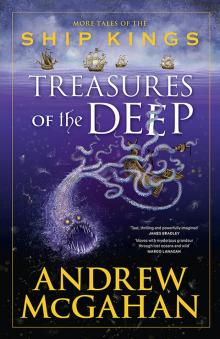 Treasures of the Deep
Treasures of the Deep The Rich Man’s House
The Rich Man’s House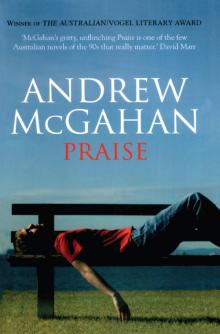 Praise
Praise The White Earth
The White Earth 1988
1988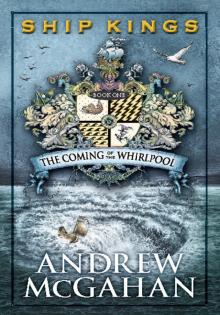 The Coming of the Whirlpool
The Coming of the Whirlpool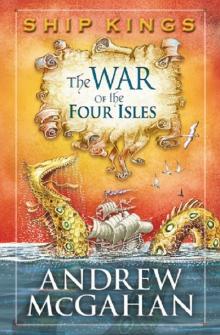 The War of the Four Isles
The War of the Four Isles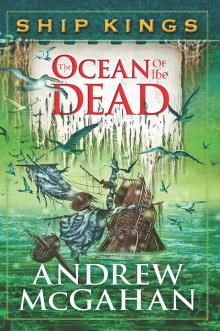 The Ocean of the Dead: Ship Kings 4
The Ocean of the Dead: Ship Kings 4 Last Drinks
Last Drinks Wonders of a Godless World
Wonders of a Godless World Underground
Underground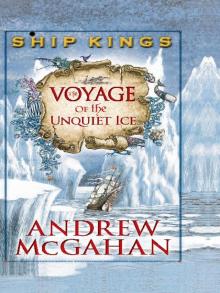 The Voyage of the Unquiet Ice
The Voyage of the Unquiet Ice